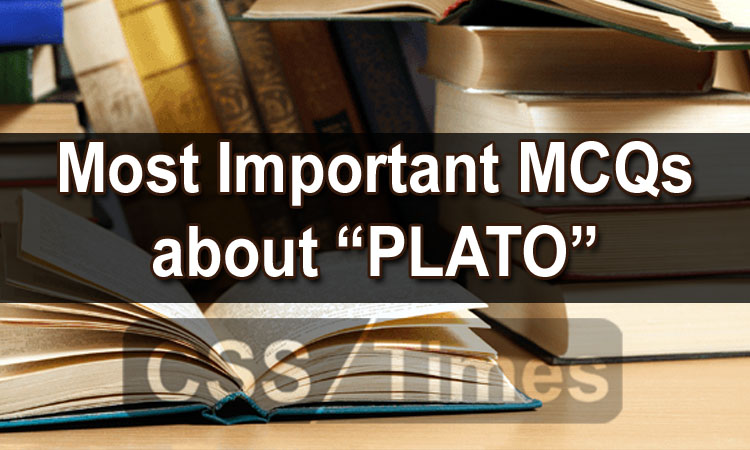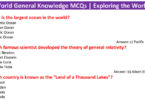CSS Political Science MCQs
Political thought, or political philosophy, is the study of questions concerning power, justice, rights, law, and other issues pertaining to governance. Whereas political science assumes that these concepts are what they are, political thought asks how they have come about and to what effect. Just as Socrates’ simple question “How should we be governed?” led to his execution, the question “What makes a government legitimate?” leads to political turmoil when posed at critical times. Political thought asks what form government should take and why; what duties citizens owe to a legitimate government, if any; and when it may be legitimately overthrown, if ever. Generally speaking, political thought, political philosophy, and political theory are terms often used interchangeably to mean the study of philosophical texts related to politics.
MCQs about Plato
Plato was born 427-8 BC and died at the age of: (CSS-2005)
(a) 80 (b) 76
(c) 74 (d) None of these
Answer: (a)
Explanation: It is widely accepted that Plato, the Athenian philosopher, was died at the age of eighty or eighty-one at 348-7 B.C.E. just after the birth of Alexander the Great.
According to Plato the population of an ideal state should be: (CSS-2010)
(a) 5040
(b) 50400
(c) 50040
(d) None of these
Answer: (a)
Explanation: In The Laws Plato recommended that to attain the ‘highest good’ an ideal and direct democracy, in a city-state, should possess nearly 5040 citizens.
The turning point in the life of Plato came in the year 399 BC when he was of: (CSS-2005/2009)
(a) 24 years
(b) 26 years
(c) 28 years
(d) None of these
Answer: (c)
Explanation: Plato was twenty-eight years old when Socrates was put to death. Plato fell in with a wandering philosopher by the name of Socrates, of whom you may have heard, who encouraged his students to challenge conventional wisdom to the point that he was finally executed in 399 BC for corrupting the youth. This, Plato would say, was a major turning point in his life, and he fled Athens to avoid a similar fate by association. He wound up in Sicily, where he joined an order of Pythagoreans (something along the line of celibate math mystics), whose fixation with numbers would inspire the cosmology Plato would become famous for.
Plato was born in: (CSS-2007)
(a) 430 B.C
(b) 428 B.C
(c) 387 B.C
(d) None of these
Answer: (b)
Explanation: Based on ancient sources, most modern scholars believe that he was born in Athens or Aegina between 428 and 423 BCE.
Check also: Everyday Science MCQs | Food Science MCQs
Plato wrote: (CSS-2000)
(a) Politics
(b) The Laws
(c) Political Economy
(d) Polity
(e) None of these.
Answer: (b)
Explanation: Plato wrote Laws during a peaceful period of full dedication to the Academy. The Laws were thought to have been in the process of publication at the time of his death.
Plato was a: (CSS-2007)
(a) Realist (b) Idealist
(c) Rationalist (d) None of these
Answer: (b)
Explanation: Platonism is the oldest form of idealism and Plato himself the progenitor of idealists.
The Fascism of Plato got birth in 4th century BC, whereas the modern Fascism is the product of: (CSS-2009)
(a) 18th Century
(b) 19th Century
(c) 20th Century
(d) None of these
Answer: (c)
Explanation: Fascism was a product of the 20th century in which conservative adoration for aristocratic hierarchy seemed anachronistic and pragmatically useless as a political stratagem.
In Plato’s Ideal State, one reaches at the pinnacle of the State order at the age of:
(a) 35 (b) 40
(c) 50 (d) None of these
Answer: (c)
Explanation: In Plato’s Ideal State at the age of 50, those with real ability reach the pinnacle of state order. They join the group of guardian class. They rule according to their own intelligence and training and must not be compelled to conform to set of outdated and inferior laws.
Aristotle was a(n) _____ while Plato was a(n) _____.
(a) Empiricist; Nativist
(b) Structuralist; Functionalist
(c) Functionalist; Structuralist
(d) Nativist; Empiricist
Answer: (a)
Explanation: Plato believed that we are born with all of our knowledge already inside us, simply waiting to be rediscovered. This concept that knowledge is innate is known as Nativism. Aristotle, a student of Plato, believed in Philosophical Empiricism, or the belief that all knowledge is acquired through experience.
Check also: CSs Political Science MCQs
10) The author of the book ‘Statesman’ is: (CSS-2000)
(a) Aristotle (b) Machiavelli
(c) Plato (d) None of these
Answer: (c)
Explanation: The Statesman also known by its Latin title, Politicus, is a Socratic dialogue written by Plato.
The author of the Book The Laws was: (CSS-2007)
(a) Homer
(b) Plato
(c) Solon
(d) None of these
Answer: (b)
Explanation: The Laws, Plato’s longest dialogue, has for centuries been recognized as the most comprehensive exposition of the practical consequences of his philosophy, a necessary corrective to the more visionary and utopian Republic.
Which of these books represents the scheme of Plato’s Philosophy? (CSS-2002)
(a) The Politics
(b) The Republic
(c) The Laws
(d) None of these
Answer: (b)
Explanation: “The Republic” is the most important and authentic work of Plato. It was about political philosophy, ethics, education and metaphysics. Other works of Plato include: “The Politicus”, “The Apology”, “The Meno”, “The Protagoras”, “The Gorgias”, and “The Critias”.
Plato wrote the famous book: (CSS-2008)
(a) Leviathan
(b) The Republic
(c) The clouds
(d) None of these
Answer: (b)
Explanation: The most comprehensive statement of Plato’s mature philosophical views appears in Πολιτεια (The Republic), an extended treatment of the most fundamental principles for the conduct of human life. Using the character “Socrates” as a fictional spokesman, Plato considers the nature and value of justice and the other virtues as they appear both in the structure of society as a whole and in the personality of an individual human being. This naturally leads to discussions of human nature, the achievement of knowledge, the distinction between appearance and reality, the components of an effective education, and the foundations of morality.
Pluto is called the father of the idealist theory of the state because:
(a) he prescribed the ideals of city-state
(b) his theory was based not on what human nature is but on what it ought to be
(c) he postulated a dualism between reality and value
(d) he based his theory on the idea of the Good
Answer: (b)
Check other Political Science MCQs for CSS
- Political Science MCQs for CSS, PCS | Introduction (Set-I)
- Daily Top-20 MCQs for CSS, PMS, PCS, FPSC (Set-24)
- Political Science MCQs (Vladimir Lenin, Mao Zedong, Antonio Gramsci)
- Political Science MCQs (Foreign Policy of Pakistan)
- Political Science MCQs | Karl Marx
- 200 Most Wanted Political Science MCQs (One Liner)
- Political Science MCQs | John Stuart Mill, Jeremy Bentham
- Political Science MCQs | (Immanuel Kant MCQs)
- Political Science MCQs | (Jean-Jacques Rousseau MCQs)
- Political Science MCQs for CSS | John Locke MCQs








[…] Check Also: Most Important MCQs about “PLATO” | CSS Political Science MCQs […]